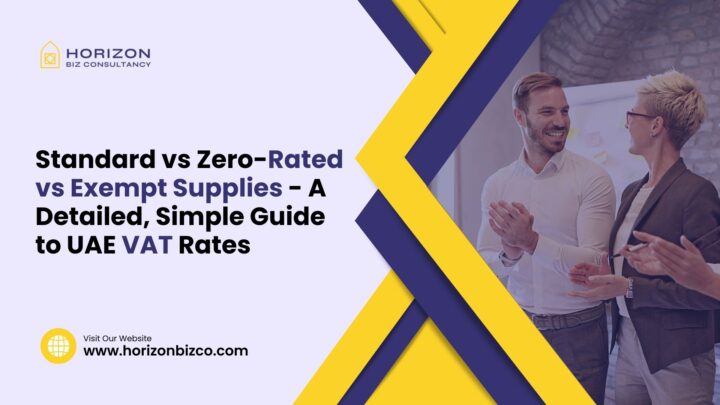Understanding how to classify supplies under the UAE’s VAT system is key. This is important for both businesses and consumers. This guide will explain what standard rated, zero rated, and exempt supplies are. It will provide examples of each. It will explain how to classify supplies well. And it will answer common questions.
What is VAT and How Does it Work?
VAT stands for Value Added Tax. It is a tax that is charged on the purchase of most goods and services. In the UAE, the standard VAT rate is 5%. This means when you buy something for 100 AED, you pay an extra 5 AED as VAT. So your total payment is 105 AED. The VAT is collected by the seller on behalf of the UAE government. The seller then pays the total VAT they collected to the Federal Tax Authority (FTA). VAT makes goods cost more for consumers. But the government uses the income for public spending on things like infrastructure and services. That’s why understanding VAT is important.
What are Standard Rated Supplies?
Standard rated supplies refer to all products and services that attract the normal 5% VAT rate in the UAE.Some common examples include:
- Electronics – mobile phones, laptops, televisions
- Clothes, shoes, accessories
- Stays at hotels or furnished accommodations
- Food and drinks from restaurants
- Ride-hailing services like Uber
- Air tickets
- Professional services like auditing, marketing, etc.
A standard rated supply is any item or service a consumer buys for personal use, unless explicitly excluded. If you sell such goods or services, you have to:
- Charge 5% VAT to customers on top of the sale value
- Collect the VAT amount and submit online VAT returns to FTA
- Pay the VAT dues to FTA after deducting refunds you may be eligible for
So you collect, report and pay 5% VAT on all standard rated supplies.
What are Zero Rated Supplies?
Standard rated supplies have a 5% VAT. But, zero rated supplies attract 0% tax. They are within the VAT system. Some major zero rated categories are:
- Basic food items – milk, rice, fruits, vegetables, meat, eggs
- Preventive healthcare services
- Medicines and medical equipment
- Education services
- International transport of goods and passengers
No VAT is charged on these supplies. But, businesses can recover VAT paid on expenses for making zero-rated supplies. This avoids double taxation and keeps essentials affordable. For example, a retailer selling rice and pulses pays VAT when buying inventory. But, they do not charge VAT to customers on sale of these zero rated food items. They can claim refund of input VAT, so cost is not passed to consumer.
What are Exempt Supplies?
Exempt supplies refer to categories that are excluded from VAT. So exempt supplies aren’t charged VAT. Input VAT can’t be recovered on related expenses. Some common examples of exempt supplies in the UAE are:
- Lending/borrowing services
- Residential rental accommodation
- Life and health insurance services
- Certain financial services
If you sell an exempt service, you do not charge VAT to customers. But, you also cannot claim tax credits on expenses from providing the exempt supply.
Why Correct Classification of Supplies Matter
Accurately classifying a supply as standard rated, zero rated or exempt is crucial for VAT compliance.
- If you treat a standard supply as exempt – you fail to charge, collect and report VAT due. This leads to tax evasion and penalties.
- If you classify a fully exempt supply as zero rated – you cannot actually recover input tax, leading to cash flow loss.
- Incorrect classification also means your VAT returns will not reconcile properly during audits by FTA.
So, before supplying any product or service, businesses must check the Federal Tax Authority’s VAT classifications guide. They need to find the right treatment.
How Do Businesses Classify Supplies?
- The FTA provides a VAT Classification List specifying whether a supply is standard rated, zero rated or exempt from VAT
- You can also search the FTA website or contact them to check classifications
- Seek guidance from financial advisors/VAT consultants if unsure
Businesses should document the logic and assumptions behind supply classification to avoid future problems. Doing proper due diligence is important given significant fines and penalties for non-compliance.
Conclusion
I hope this detailed guide to standard, zero rated and exempt supplies in the UAE VAT system helps explain the key concepts clearly. Classifying supplies incorrectly leads to tax burdens and compliance problems for businesses. Please reach out if you need any assistance with setting up VAT reporting or navigating classifications.
FAQ
Standard rated supplies have 5% VAT. Zero rated supplies attract 0%. Exempt supplies do not have any VAT.
Only expenses related to making standard rated and zero rated supplies allow input VAT refunds. Costs for exempt supplies do not.
This is viewed as evasion of due tax. You fail to collect and report VAT owed to FTA. There are strict fines and penalties for such violations.





